#Coalition Avenir Québec
Text
Seeking English-language services from various kinds of government services in Quebec just became trickier — and the latest change isn’t going over well.
The François Legault government’s linguistic overhaul, known as Bill 96, is designed to protect and bolster the French language in the province. The goal is to guard against its decline, the government says, especially in Montreal.
After delays, more provisions of the law came into effect Thursday — one of which heavily relies on a self-imposed honour system in some cases.
Under the law, civil servants must now use French in an “exemplary” manner, which means they must speak and write exclusively in the language, except in certain cases. The new rule does not apply to the health and social services settings, according to Quebec’s language watchdog.
The latest restriction means only designated groups — such as Quebecers who have the right to English-language schooling, Indigenous people and immigrants who have been here for less than six months — can receive government services in English. [...]
Continue Reading.
Tagging: @politicsofcanada
567 notes
·
View notes
Text
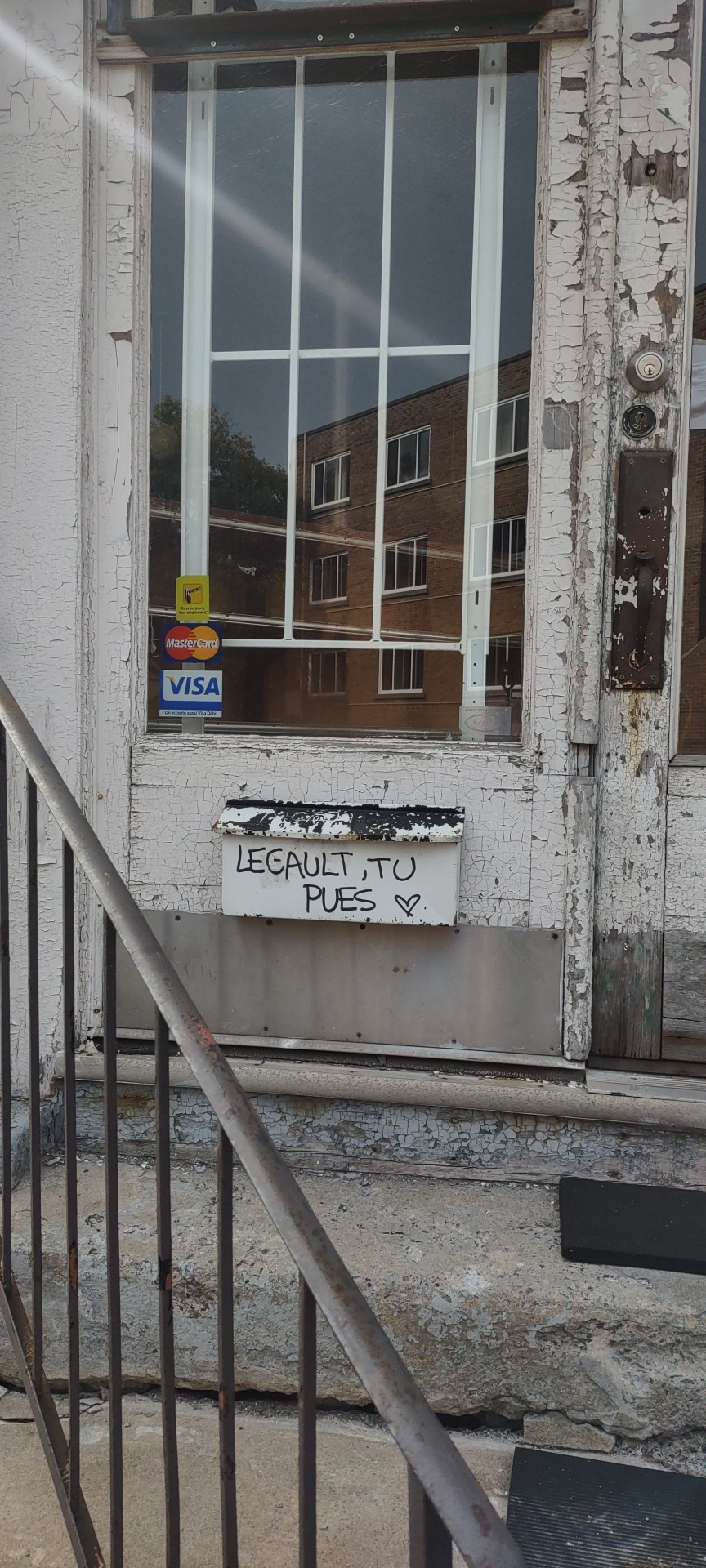
557
#legault tu pues <3#montreal#francois legault#original photographers#tiohtià:ke#original photography on tumblr#original photographs#original photography#quebec#caq#coalition avenir québec#mtl#mooniyang#canada#cityphotography#mtlmoments#mtlphoto#city photography#streetphotography#streetphoto#plateau mont royal#streetart#street#street art#montreal street photography#street photography#montreal street art#montréal#mtlart#plateau
15 notes
·
View notes
Text
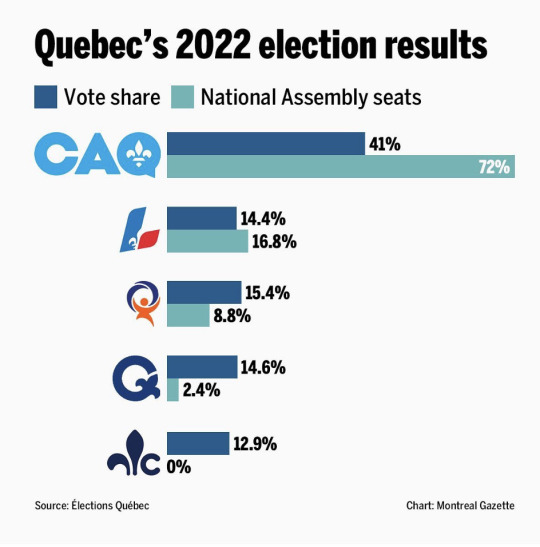
Last night’s election in Quebec, while sadly no surprise, is yet another argument that our First Past the Post electoral system is broken.
The party with 41% of the popular vote gets 72% of the seats in the National Assembly. Meanwhile, the four main opposition parties are all within a few points of each other, yet their seat count is wildly different from each other.
Interestingly, the CAQ campaigned in 2018 on electoral reform, which they quickly abandoned as soon as they realized how much it advantages them.
So another four years of nativist, paternalistic, immigrant bashing for Quebec because that seems to be Legault’s winning formula.
3 notes
·
View notes
Text
Quebec again revises deficit increase in 2023-2024 to $7.5 billion
Article content
QUEBEC CITY — The Quebec government has once again revised the increase in its deficit for the 2023-2024 financial year — to $7.5 billion — highlighting a context of stagnation in economic activity in the province.
It represents an upward revision of $1.2 billion from the figures presented in the Coalition Avenir Québec budget last March.
At that time, the deficit was forecast at $6.3 billion, up from the previous evaluation of $4 billion.
Article content
The CAQ asserts economic uncertainty led to a revision of the balance in the budget attributed mainly to a decrease of $1.1 billion in own-source revenue.
In its report on Quebec’s financial situation published June 28, the government maintains the stagnation is in part attributable to temporary factors, such as difficult weather conditions, forest fires and strikes in the public and parapublic sectors.
The government highlighted as well a reduction of the top two personal income-tax rates on personal income announced in the 2023-2024 budget had the effect of moderating the growth of own-source revenues.
According to “preliminary results” presented on Friday, expenses advanced more quickly than revenues, growing by 2.2 per cent. As well, portfolio expenses increased by 2.5 per cent, notably in health and social services, family and higher education.
The deficit linked to activities, that is before taking into account payments of revenue dedicated to the $2 billion Generations Fund, was set at $5.4 billion.
Quebec Finance Minister Eric Girard said the increase in the deficit did not call into question the government’s plan to return to a balanced budget “at the latest” in 2029-2030.
“We have been at work since March to optimize government action and we are continuing to review of all government spending to identify sources of saving,” he said in a communiqué.
When the budget was presented, the government said the projected deficit for 2024-2025 would reach $11 billon, taking into account the contribution to the Generations Fund.
The government said it would launch an operation to “optimize” the actions of the state, with the goal of generating additional revenues of $2.9 billion.
Recommended from Editorial
‘It’s not true that it’s the worst deficit,’ Legault fires back at critics
Quebec budget highlights: With record $11-billion deficit, province looks for savings
Quebec budget: Opposition slams CAQ ‘incompetence’ as deficit balloons
Share this article in your social network
Source link
via
The Novum Times
0 notes
Text
Grieving parents said they were told to pay $200 to meet Quebec minister
0 notes
Text
The Conservative Party of Quebec 🇨🇦⚜️ (CPQ; French: Parti conservateur du Québec (PCQ)) is a provincial political party in Quebec, Canada. It was authorized on 25 March 2009 by the Chief Electoral Officer of Quebec.[2] The CPQ has gradually run more candidates in successive elections, with 27 in the 2012 general election and 125 (all seats contested) in 2022. The party has not won a seat in the National Assembly of Quebec; however, under leader Éric Duhaime the CPQ won about 12.9% of the popular vote in the 2022 election, a major increase from prior elections. Previously on June 18, 2021 Claire Samson crossed the floor to join the party after having won election in 2018 as a candidate of the governing Coalition Avenir Québec (CAQ).
0 notes
Text
Coalition Avenir Québec - Wikipedia
Centre-right politics lean to the right of the political spectrum, but are closer to the centre. Parties of the centre-right generally support liberal democracy, capitalism, the market economy, private property rights, and a modest welfare state. They support conservatism and economic liberalism and oppose socialism and communism.[1]
SKYLINE SUBS
0 notes
Text
"Unveiling the Momentous Upset: A Surprising Victory for Parti Québécois in Jean Talon, Quebec-Montreal!"
In a surprising turn of events, lawyer Pascal Paradis, the Parti Québécois (PQ) candidate, emerged victorious in Monday’s by-election in the Quebec City riding of Jean-Talon, successfully defeating the Coalition Avenir Québec (CAQ) and securing the seat for the PQ. This victory marked the first time that a PQ candidate had ever been elected in Jean-Talon, a riding that had long been considered a…
View On WordPress
0 notes
Text
The Quebec Liberal Party (QLP) lashed out on Saturday at the CAQ government's decision to substantially increase tuition fees for new non-Quebec students enrolling in English-language universities.
According to interim Liberal leader Marc Tanguay, François Legault is a disguised PQer who likes to divide and who has built his political career by dividing Quebecers.
He pointed out that Legault was a Parti Québécois (PQ) MNA and minister from 1998 to 2009.
In a press scrum at the QLP general council on Saturday morning, Tanguay added that we will not advance the French language in Quebec by beating the heads of students who come here to study in English.
The QLP's elected representatives and party members all denounced the CAQ government's decision. [...]
Continue Reading.
Tagging: @politicsofcanada
106 notes
·
View notes
Text
Quebec has Released its Immigration Strategy for 2023
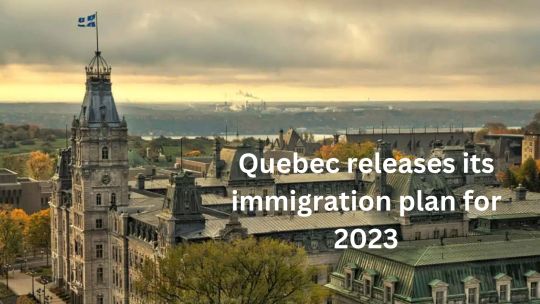
Overall admissions remain unchanged from 2022, with little variation across all categories.
According to the Quebec Immigration Plan for 2023, which was released on December 8, the province could admit up to 52,500 new permanent residents in 2023. This goal is identical to the immigration plan for 2022.
In 2023, the majority of new admissions to Quebec will be through the province’s economic immigration programmes, such as the Quebec Skilled Worker Program (QSWP) and the Québec Experience Program (PEQ).
The new plan adheres to the goals established during the public consultation held in the summer of 2019 as part of Quebec Immigration Planning for 2020-2022.
The economic category, with a maximum target of 33,900, represents the largest proportion of newcomers, accounting for more than 65% of planned admissions. The province anticipates welcoming up to 29,500 skilled workers in this category.
The remaining 18,100 new permanent residents are anticipated to come through various immigration programmes for refugees, family reunification, and other categories.
The Immigration Department of Quebec presents its immigration strategy each year. The document specifies the categories in which the province will admit the amount of new permanent residents it plans to accept in the upcoming year. Plans have only been made public thus far that include goals for the upcoming year. However, a consultation will be held in 2023 after which the province will draught a multi-year plan that will start in 2024.
Attention to French-Speaking Immigrants
The 2023 plan is similar to the 2022 plan because the Coalition Avenir Québec (CAQ) won a second term as the governing party with a large majority earlier this year.
After lowering admission targets in 2019, the 2022 plan, led by current Prime Minister François Legault, aimed to gradually increase the number of newcomers. The CAQ implemented a 20% reduction that year in order to improve the selection and francization of newcomers to Quebec.
The protection of the French language in Quebec is one of the CAQ party’s main pillars, and the new plan focuses on selecting immigrants who already speak French. The Ministry of Immigration, Francization, and Integration anticipates that 79% of economic immigrants and 66% of all immigrants will be fluent in French by 2023.
During this year’s provincial election in Quebec, immigration was a hotly debated topic. Legault pledged during his campaign that he would only allow 50,000 newcomers into Quebec per year for the duration of his term. He claims that this is the maximum number of immigrants that Quebec can accept because it is difficult to integrate newcomers into Quebec society, especially those who need to learn French.
Quebec’s Distinctive Immigration Policy
The only province in Canada that publishes a yearly strategy for immigration levels is Quebec. Additionally, it is the only province whose admissions for economic immigration are completely under its control.
Quebec has greater control over its immigration policies, largely as a result of the establishment of its own immigration ministry there in 1968. Up until more than 20 years later, in 1991, when the Quebec-Canada Accord gave the province the authority to set its own admission targets, the province persisted in calling for greater control over immigration.
Nevertheless, immigration is a joint duty between the federal and provincial governments, and Immigration, Refugees and Citizenship Canada (IRCC) has the last say on all admissions, regardless of the category of immigration. Quebec chooses the skilled workers it wants to admit.
Ways to Move to Quebec
Anyone wishing to immigrate to Quebec must obtain permission from both the provincial and federal governments. Quebec chooses skilled immigrants based on its own criteria and procedures, and applicants must apply directly to the province via one of its immigration programmes.
If a candidate meets the program’s criteria and is chosen by Quebec, they and any accompanying family members will receive a Certificat de sélection du Québec (CSQ). This document was issued by the Quebec Ministry of Immigration, Francisation, and Integration.
After receiving a CSQ, a candidate must apply to IRCC for permanent residence and pass the required security, criminal history, and medical checks.
0 notes
Text
Quebec adopts law making oath to King optional for elected members
Quebec adopts law making oath to King optional for elected members
Quebec’s legislature has passed a law putting an end to the requirement that members swear an oath to the King.
The Coalition Avenir Québec government had tabled a bill on Tuesday making the oath to the monarch optional after three members of the opposition Parti Québécois refused to swear the oath and were barred from sitting.
The law adds a section to the Constitution Act of 1867, exempting…
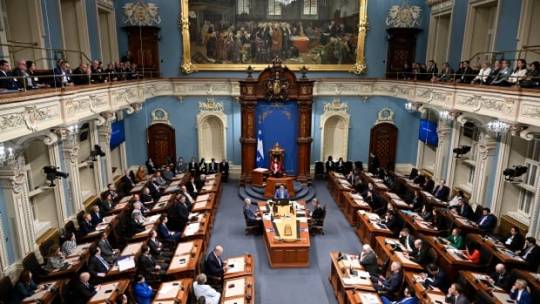
View On WordPress
0 notes
Text
Number of immigrants welcomed in Quebec | Official numbers don't tell the whole story
Number of immigrants welcomed in Quebec | Official numbers don’t tell the whole story
While we are tearing ourselves apart over whether we should welcome more or less than 50,000 immigrants a year, a threshold that the Coalition avenir Québec (CAQ) does not want to exceed, Quebec actually welcomes almost twice as many.
A total of 90,900 people from other countries settled in Quebec from 1er July 2021 to June 30, 2022.
The difference is temporary immigrants, people who came to…
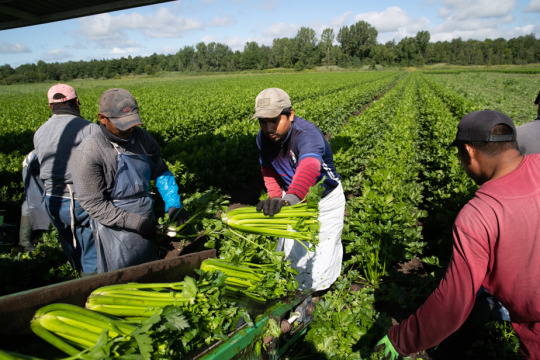
View On WordPress
0 notes
Text
Legault says accepting more than 50,000 immigrants in Quebec per year would be 'a bit suicidal'
Legault says accepting more than 50,000 immigrants in Quebec per year would be ‘a bit suicidal’
The Coalition Avenir Québec is once again coming under fire for comments about immigration, including party leader François Legault saying that welcoming more than 50,000 immigrants per year would be “a bit suicidal.”
Legault made that statement on Monday at the Montreal Chamber of Commerce while alluding to the need to protect the French language.
Although his words drew criticism from his…

View On WordPress
0 notes
Text
Quebec again revises deficit increase in 2023-2024 to $7.5 billion
Article content
QUEBEC CITY — The Quebec government has once again revised the increase in its deficit for the 2023-2024 financial year — to $7.5 billion — highlighting a context of stagnation in economic activity in the province.
It represents an upward revision of $1.2 billion from the figures presented in the Coalition Avenir Québec budget last March.
At that time, the deficit was forecast at…

View On WordPress
0 notes
Text
Landlords could cancel rental lease transfers under new Quebec bill
0 notes
Text
0 notes